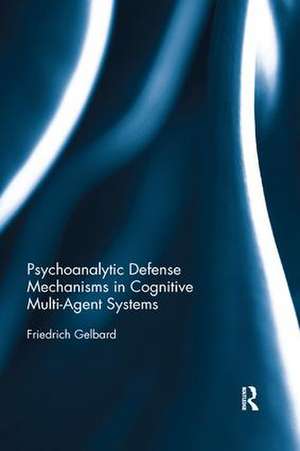Psychoanalytic Defense Mechanisms in Cognitive Multi-Agent Systems
Autor Friedrich Gelbarden Limba Engleză Paperback – 27 sep 2018
With discussions focusing on the development of a mathematical description for the implementation of conflict detection, the activation and selection of defense mechanisms, and the processing of defense mechanisms, Psychoanalytic Defense Mechanisms in Cognitive Multi-Agent Systems describes the decisive points for the application of defense mechanisms in artificial intelligence. Formulae that treat defense mechanisms as transformations are also provided. Interdisciplinary cooperation between the scientific fields of psychoanalysis and artificial intelligence is highlighted as the foundation of new research findings throughout the book.
Innovative and exciting, this book will be of great interest to academics, researchers, and postgraduates in the fields of cognitive science, artificial intelligence, and psychoanalysis.
Preț: 410.25 lei
Nou
Puncte Express: 615
Preț estimativ în valută:
78.52€ • 81.75$ • 66.35£
78.52€ • 81.75$ • 66.35£
Carte tipărită la comandă
Livrare economică 10-24 martie
Preluare comenzi: 021 569.72.76
Specificații
ISBN-13: 9780367133900
ISBN-10: 0367133903
Pagini: 212
Ilustrații: 39
Dimensiuni: 156 x 234 x 11 mm
Greutate: 0.31 kg
Ediția:1
Editura: Taylor & Francis
Colecția Routledge
Locul publicării:Oxford, United Kingdom
ISBN-10: 0367133903
Pagini: 212
Ilustrații: 39
Dimensiuni: 156 x 234 x 11 mm
Greutate: 0.31 kg
Ediția:1
Editura: Taylor & Francis
Colecția Routledge
Locul publicării:Oxford, United Kingdom
Public țintă
Postgraduate and ProfessionalCuprins
1. Motivation, Requirements, and Methodology 2. Context of the Field of Research 3. Concepts to Develop a Technical Model of the Human Mind 4. Technical Model of the Defense Processes 5. Implementation of the Defense Processes 6. Simulation Environment and Performed Processes 7. Conclusion and Outlook
Notă biografică
Dr Friedrich Gelbard has been a researcher in the fields of cognitive science and multi-agent systems for more than ten years. He holds degrees in telecommunications and software engineering, and he has been a research assistant at the Vienna University of Technology for the last eight years. He worked in New York City for one year.
Recenzii
‘This book provides a refreshing, interdisciplinary perspective on how to build an Artificial General Intelligence. Friedrich Gelbard very systematically not only conceptualizes, but also implements a cognitive architecture based on theoretical contributions from psychoanalysis -- a much neglected approach in mainstream artificial intelligence research. I highly recommend this contribution as a 'must read' for any interdisciplinary scholar at the intersection between multi-agent systems, cognitive science, and affective computing.’ - Christian Becker-Asano, Corporate Sector Research and Advance Engineering, Robert Bosch GmbH, Germany"
Descriere
Human cognitive processes and defense mechanisms, as described in psychoanalysis, bring about new notions and paradigms for artificial intelligence systems. One key reason is that the human cognitive processes and defense mechanisms in question can accomplish conflict detection functionalities, filter functionalities, and other system stabilizing tasks within artificial intelligence systems. Yet artificial cognitive architectures lack the capability to analyze complex situations as well as the universal competencies needed to orientate themselves in complex environments in various domains. Psychoanalytic Defense Mechanisms in Cognitive Multi-Agent Systems addresses this dilemma by exploring how to describe, model, and implement psychoanalytic defense mechanisms in the course of a project that provides a functional model of the human mind.
With discussions focusing on the development of a mathematical description for the implementation of conflict detection, the activation and selection of defense mechanisms, and the processing of defense mechanisms, Psychoanalytic Defense Mechanisms in Cognitive Multi-Agent Systems describes the decisive points for the application of defense mechanisms in artificial intelligence. Formulae that treat defense mechanisms as transformations are also provided. Interdisciplinary cooperation between the scientific fields of psychoanalysis and artificial intelligence is highlighted as the foundation of new research findings throughout the book.
Innovative and exciting, this book will be of great interest to academics, researchers, and postgraduates in the fields of cognitive science, artificial intelligence, and psychoanalysis.
With discussions focusing on the development of a mathematical description for the implementation of conflict detection, the activation and selection of defense mechanisms, and the processing of defense mechanisms, Psychoanalytic Defense Mechanisms in Cognitive Multi-Agent Systems describes the decisive points for the application of defense mechanisms in artificial intelligence. Formulae that treat defense mechanisms as transformations are also provided. Interdisciplinary cooperation between the scientific fields of psychoanalysis and artificial intelligence is highlighted as the foundation of new research findings throughout the book.
Innovative and exciting, this book will be of great interest to academics, researchers, and postgraduates in the fields of cognitive science, artificial intelligence, and psychoanalysis.
